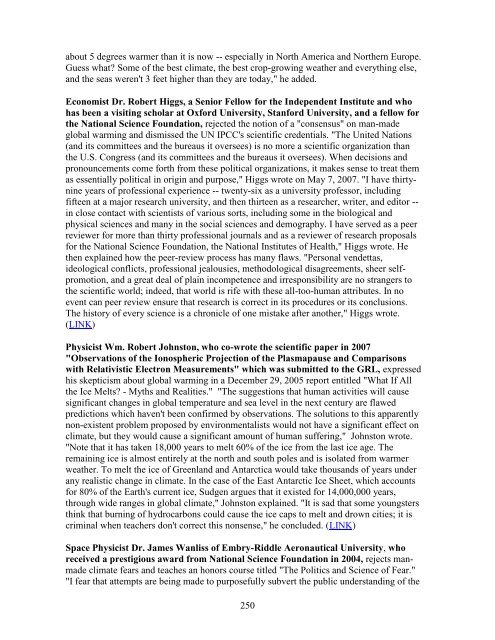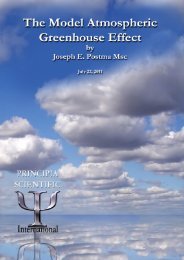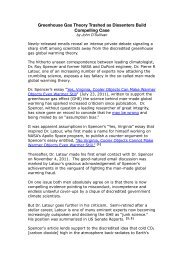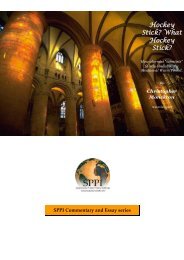Than 1000 International Scientists Dissent Over Man-Made Global ...
Than 1000 International Scientists Dissent Over Man-Made Global ...
Than 1000 International Scientists Dissent Over Man-Made Global ...
Create successful ePaper yourself
Turn your PDF publications into a flip-book with our unique Google optimized e-Paper software.
about 5 degrees warmer than it is now -- especially in North America and Northern Europe.<br />
Guess what? Some of the best climate, the best crop-growing weather and everything else,<br />
and the seas weren't 3 feet higher than they are today," he added.<br />
Economist Dr. Robert Higgs, a Senior Fellow for the Independent Institute and who<br />
has been a visiting scholar at Oxford University, Stanford University, and a fellow for<br />
the National Science Foundation, rejected the notion of a "consensus" on man-made<br />
global warming and dismissed the UN IPCC's scientific credentials. "The United Nations<br />
(and its committees and the bureaus it oversees) is no more a scientific organization than<br />
the U.S. Congress (and its committees and the bureaus it oversees). When decisions and<br />
pronouncements come forth from these political organizations, it makes sense to treat them<br />
as essentially political in origin and purpose," Higgs wrote on May 7, 2007. "I have thirtynine<br />
years of professional experience -- twenty-six as a university professor, including<br />
fifteen at a major research university, and then thirteen as a researcher, writer, and editor --<br />
in close contact with scientists of various sorts, including some in the biological and<br />
physical sciences and many in the social sciences and demography. I have served as a peer<br />
reviewer for more than thirty professional journals and as a reviewer of research proposals<br />
for the National Science Foundation, the National Institutes of Health," Higgs wrote. He<br />
then explained how the peer-review process has many flaws. "Personal vendettas,<br />
ideological conflicts, professional jealousies, methodological disagreements, sheer selfpromotion,<br />
and a great deal of plain incompetence and irresponsibility are no strangers to<br />
the scientific world; indeed, that world is rife with these all-too-human attributes. In no<br />
event can peer review ensure that research is correct in its procedures or its conclusions.<br />
The history of every science is a chronicle of one mistake after another," Higgs wrote.<br />
(LINK)<br />
Physicist Wm. Robert Johnston, who co-wrote the scientific paper in 2007<br />
"Observations of the Ionospheric Projection of the Plasmapause and Comparisons<br />
with Relativistic Electron Measurements" which was submitted to the GRL, expressed<br />
his skepticism about global warming in a December 29, 2005 report entitled "What If All<br />
the Ice Melts? - Myths and Realities." "The suggestions that human activities will cause<br />
significant changes in global temperature and sea level in the next century are flawed<br />
predictions which haven't been confirmed by observations. The solutions to this apparently<br />
non-existent problem proposed by environmentalists would not have a significant effect on<br />
climate, but they would cause a significant amount of human suffering," Johnston wrote.<br />
"Note that it has taken 18,000 years to melt 60% of the ice from the last ice age. The<br />
remaining ice is almost entirely at the north and south poles and is isolated from warmer<br />
weather. To melt the ice of Greenland and Antarctica would take thousands of years under<br />
any realistic change in climate. In the case of the East Antarctic Ice Sheet, which accounts<br />
for 80% of the Earth's current ice, Sudgen argues that it existed for 14,000,000 years,<br />
through wide ranges in global climate," Johnston explained. "It is sad that some youngsters<br />
think that burning of hydrocarbons could cause the ice caps to melt and drown cities; it is<br />
criminal when teachers don't correct this nonsense," he concluded. (LINK)<br />
Space Physicist Dr. James Wanliss of Embry-Riddle Aeronautical University, who<br />
received a prestigious award from National Science Foundation in 2004, rejects manmade<br />
climate fears and teaches an honors course titled "The Politics and Science of Fear."<br />
"I fear that attempts are being made to purposefully subvert the public understanding of the<br />
250





